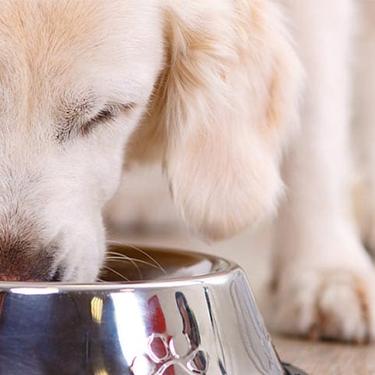
-
Find the right food for your pet
Take this quiz to see which food may be the best for your furry friend.
Find the right food for your pet
Take this quiz to see which food may be the best for your furry friend.
Featured products
 Adult 7+ Perfect Digestion Chicken, Whole Oats & Brown Rice Recipe Dog Food
Adult 7+ Perfect Digestion Chicken, Whole Oats & Brown Rice Recipe Dog FoodScience Diet's breakthrough nutrition supports ultimate digestive well-being & healthy microbiome for dogs age 7+
Shop Now Adult Healthy Cuisine Roasted Chicken, Carrots & Spinach Stew Dog Food
Adult Healthy Cuisine Roasted Chicken, Carrots & Spinach Stew Dog FoodDelicious roasted chicken paired with tender vegetables in a succulent stew
Shop Now Small & Mini Savory Stew with Chicken & Vegetables Dog Food
Small & Mini Savory Stew with Chicken & Vegetables Dog FoodA delicious complement to the nutrition of Science Diet Small & Mini 7+ dog food
Shop NowFeatured products
 Adult Savory Entrée Can Variety Pack Cat Food
Adult Savory Entrée Can Variety Pack Cat FoodPrecisely balanced nutrition with the delicious taste of savory minced chicken to help fuel the energy needs of cats during the prime of their life
Shop Now Adult 7+ Tender Tuna Dinner Cat Food
Adult 7+ Tender Tuna Dinner Cat FoodWith delicious chunks in a decadent gravy
Shop Now Adult 7+ Senior Vitality Chicken & Vegetable Stew Cat Food
Adult 7+ Senior Vitality Chicken & Vegetable Stew Cat FoodImproves Everyday Ability to Get Up & Go
Shop Now -
Dog
- Dog Tips & Articles
-
Health Category
- Weight
- Food & Environmental Sensitivities
- Urinary
- Digestive
- Joint
- Kidney
-
Life Stage
- Puppy Nutrition
- Adult Nutrition
- Senior Nutrition
Cat
- Cat Tips & Articles
-
Health Category
- Weight
- Skin & Food Sensitivities
- Urinary
- Digestive
- Kidney
-
Life Stage
- Kitten Nutrition
- Adult Nutrition
Featured articles
 Why Are Dogs and Cats So Cute?
Why Are Dogs and Cats So Cute?If waggy puppy dog tails and furry kitten yawns make you swoon, you're not alone. Why are cats so cute? And, dogs too! Let's find out!
Read More Does My Pet Hate Me?
Does My Pet Hate Me?Learn tips for bonding with your pet if you've ever thought, 'My dog doesn't like me, or 'Why do I have a standoffish cat?'
Read More Do Dogs and Cats have Belly Buttons?
Do Dogs and Cats have Belly Buttons?Learn whether cats & dogs have belly buttons like humans, what the function is, and if there are any health concerns associated with it.
Read More -


Your dog loves you with their whole heart, but what happens when their heart isn’t working as it should? Cardiomyopathy is a common heart disease among dogs, and by paying attention to any of your dog's symptoms and bringing them to the veterinarian for regular heart screenings, you can help detect these heart issues and more quickly begin treatment when possible.
There are two major types of cardiomyopathy dogs suffer from: Dilated cardiomyopathy (DCM), and Hypertrophic cardiomyopathy, which is less common in dogs than cats.
Dilated Cardiomyopathy in Dogs
Dilated cardiomyopathy is one of the most common heart diseases in dogs, according to the Pet Health Network. With DCM, heart muscles degenerate and wear thin. Thinner muscle walls decrease the heart’s contractility (how strong it can contract and pump blood), which effectively leads to congestive heart failure.
Though we don't entirely understand what causes DCM in dogs, this type of cardiomyopathy is most often diagnosed in large and giant breed dogs who are middle-aged and older. The disease is at least partly genetic, and nutrition may also play a part, according to the University of Illinois College of Veterinary Medicine. Breeds such as Doberman pinschers and boxers are also prone to breed-specific arrhythmias (irregular heartbeats) that may develop into DCM.
If you notice any of the following signs, you should have your dog checked for DCM:
- Exercise intolerance and a general slowing down (common in the disease's early stages)
- Feet are cool to the touch
- Coughing
- Pot-bellied appearance
- Decreased appetite
- Labored breathing
If your dog experiences rapid and heavy breathing, a blue tongue, or if they collapse, you should seek emergency veterinary treatment.
Genetics and nutrition may hold the key to understanding Dilated Cardiomyopathy (DCM), and scientists at Hill’s Pet Nutrition and Embark are partnering on a research project to investigate. This collaborative research will explore options for early detection of DCM, genetic risk factors for DCM (nutritional and non-nutritional), and potential solutions to support healthy recovery of affected dogs. If your dog has been diagnosed with DCM and you'd like to participate in this important research project please fill out this survey.
Hypertrophic Cardiomyopathy in Dogs
Hypertrophic cardiomyopathy (HCM) is more common among cats and rarely occurs in dogs. Unlike DCM, this disease is characterized by a thickening of one or more parts of the heart's walls. HCM has been reported in Airedales, Great Danes, Boston terriers, poodles, bulldogs, and pointers. If your dog has HCM, their vet may recommend treatment for congestive heart failure along with exercise restriction and nutritional therapy.
A dog with HCM might not show any particular signs, but if you notice any of the following, you should contact your veterinarian:
- Fainting
- Signs of heart failure, including cough and exercise intolerance
Occult Cardiomyopathy in Doberman Pinschers

Occult cardiomyopathy — a progressive disease that causes abnormal heart rhythms — affects a large number of adult Doberman pinschers.
Dobermans with occult cardiomyopathy may have no clinical signs for years until arrhythmias progress, and DCM may develop. Older dogs who develop DCM may experience exercise intolerance. Fainting or sudden death may also occur. The best way to avoid these outcomes is to take your Doberman for annual screenings, as they make it more likely that the disease will be detected, and the arrhythmia will be controlled.


Tasty Tips
Boxer Cardiomyopathy

Boxer cardiomyopathy, also called arrhythmogenic right ventricle cardiomyopathy, is a disease that affects a Boxer’s heart muscles and causes arrhythmias. These arrhythmias usually arise from the right ventricle, according to the Cornell University College of Veterinary Medicine. Fainting episodes or sudden death can occur.
Boxers usually don't show signs of the disease unless their arrhythmias become severe. Arrhythmias may be detected during physical exams or screenings for the condition.
Diagnosis of Cardiomyopathy in Dogs
Your dog's vet can listen to their heart with a stethoscope to identify abnormalities, but murmurs or irregular rhythms aren't always detectable. Further tests are needed to accurately diagnose cardiomyopathy, such as:
- Chest radiographs
- Blood and urine tests (to evaluate the function of organs that may be impaired as a result of heart disease)
- An electrocardiogram
- An ultrasound of the heart (also called an echocardiogram)
Treatment of Cardiomyopathy in Dogs
Cardiomyopathies can be serious diseases and should be diagnosed and treated appropriately. Most dogs with cardiomyopathy improve with treatment, and your veterinarian may prescribe one or more of the following medications:
- Diuretics to help remove excess fluid from the body
- Angiotensin-converting enzyme (ACE) inhibitors to lower blood pressure and make it easier for blood to flow out of the heart
- Digitalis glycosides to help slow the heart rate and strengthen contractions
- Vasodilators to dilate the arteries/veins and put less stress on the heart to pump blood
- Pimobendan: Medicine with promising results in dogs with DCM.
Nutrition and Cardiomyopathy in Dogs
Your vet may recommend nutritional changes that can help manage cardiovascular health in your pet, including:
- Controlled salt intake helps maintain normal blood pressure
- Although taurine is not an essential nutrient for dogs, it can help support cardiac muscle metabolism. In several dog breeds, there is a strong link between taurine and dilated cardiomyopathy.
- L-carnitine supports healthy heart function
- B-vitamins magnesium may be lost in dogs that receiving diuretics
- Avoiding an excess of protein or phosphorus, which can stress a pet’s kidney health in addition to their heart condition
- Omega-3 fatty acids may help that is common in dogs with heart disease
Be sure to speak with your dog's vet before making any changes to their meal plan.
If you suspect your dog may have heart disease, it's crucial to work with your dog's vet to accurately diagnose and treat the condition. Many dogs with cardiomyopathy continue to live happy lives with hearts healthy to love their pet parents for years to come.


Dr. Laci Schaible is a small animal veterinarian, veterinary journalist, and a thought leader in the industry. She received her Doctor of Veterinary Medicine from Texas A&M University and her Masters in Legal Studies from Wake Forest University.
Related products
Related articles

Learn the the dangers of feeding your dog chocolate, which types are most dangerous, and what to do if you discover that they have consumed chocolate.

Learn about choosing the right dog food to help ensure your adult dog will receive the correct balance of nutrition.

Proper nutrition for your pregnant or nursing dog is vital to her and her puppy's health. Learn what you should do provide her with the proper nutrients.

Learn how today's wet dog food blends have gotten a face lift, and how you'll provide your dog the nutrition he needs in the form he loves.

Put your dog on a diet without them knowing
Our low calorie formula helps you control your dog's weight. It's packed with high-quality protein for building lean muscles, and made with purposeful ingredients for a flavorful, nutritious meal. Clinically proven antioxidants, Vitamin C+E, help promote a healthy immune system.
Put your dog on a diet without them knowing
Our low calorie formula helps you control your dog's weight. It's packed with high-quality protein for building lean muscles, and made with purposeful ingredients for a flavorful, nutritious meal. Clinically proven antioxidants, Vitamin C+E, help promote a healthy immune system.

